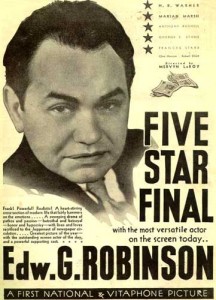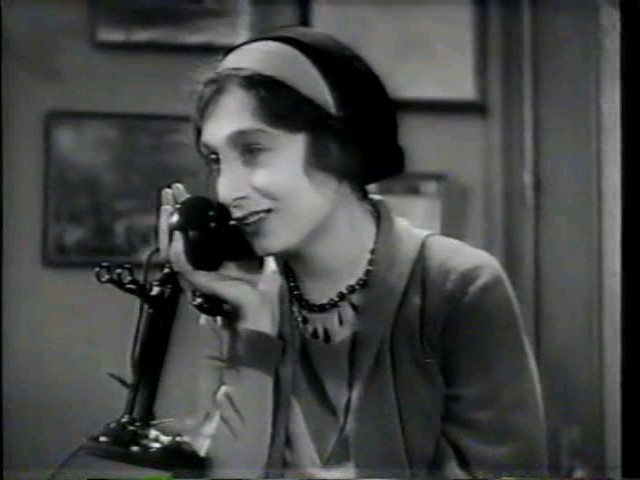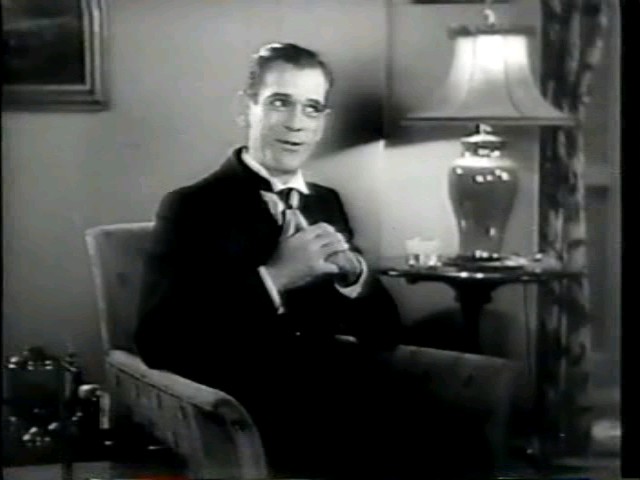|

Synopsis:
Hoping to boost circulation of his newspaper, editor Joseph Randall (Edward G. Robinson) begins a series of “Where is she now?” articles on a woman named Nancy Voorhees (Frances Starr), who shot her lover 20 years earlier. Nancy’s happiness over the impending wedding of her grown daughter (Marian Marsh) to a kind society boy (Anthony Bushell), as well as her own loving marriage to Michael (H.B. Warner), is immediately threatened by this resurgence of interest in her long-buried past.
|
|
Genres, Themes, Actors, and Directors:
- Boris Karloff Films
- Downward Spiral
- Edward G. Robinson Films
- Journalists
- Mervyn LeRoy Films
- Play Adaptations
Review:
Five Star Final was one in a cycle of newspaper-themed films made in Hollywood during the early 1930s, the most famous of which was The Front Page (1931). Based on a play by former editor Louis Weitzenkorn, Five Star is unabashedly critical of muckraking journalistic practices, clearly positing greedy newspaper owners as callous, mercenary, and willing to do nearly anything to boost circulation. In a way, not much has changed since then: we’re still a tabloid-happy society, and notorious individuals are never entirely free from the prowling feelers of The Media. While Five Star deals with an enduring dilemma, however, the story itself comes across as stilted and somewhat dated. It’s unlikely that a notorious “murderess” such as Nancy Voorhees would be able to successfully hide her past from everyone around her, and even less likely that she and her husband would react the way they do once she’s “found out”. In addition, the “baddies” of the film (including Robinson’s bosses, and Bushell’s parents) play their parts far too broadly, lacking any nuance whatsoever. The best scenes in the film are those between Robinson (wonderful as always) and his knowing secretary, Aline MacMahon — but these are relatively few and far between. Also notable is Boris Karloff in (naturally) a creepy turn as an unscrupulous investigative journalist. On the whole, however, Five Star Final hasn’t aged well enough to recommend as must-see viewing.
Redeeming Qualities and Moments:
- Edward G. Robinson as Randall (Peary nominates Robinson for an Alternate Oscar as best actor of the year)

- Aline MacMahon as Randall’s secretary

- Boris Karloff as “Reverend Isopod”

Must See?
No. Despite its historical importance as a best-picture Oscar nominee, this ultimately isn’t must-see viewing.
Links:
|
One thought on “Five Star Final (1931)”
In agreement here, for most of the stated reasons; not a must.
However, some observations:
As the ex-bad girl who has tried her best to turn over a new leaf, Frances Starr plays a unique character at this time in cinema – and she plays the role rather believably. It’s a bit heartbreaking when we realize the effort she has made to re-invent herself, and how close she has come to complete social acceptance (even if she may have found herself with a whole other set of problems once closely knit with the groom’s mother, the one whose main interest in life is its “social registry”).
Watching this movie reminded me of how film studio heads in this era were very conscious of making films for ‘the little people’ – that is, with them very much in mind. So many movies of this period are manipulative in this way. Producers themselves may or may not have had such high principles, but you could count on a lot of soap-box moral philosophy as screen stories drew to a close.
Yes, the dependable Robinson is “wonderful as always”, and his growing interest in MacMahon (and vice versa) is nicely done.
For what it’s worth, the film does get better as it goes, and momentum builds (which is evidence of director Mervyn LeRoy’s skill as an economical director) – but all then goes rather OTT script-wise, esp. once it gets to pistol-packin’ Marsh’s I’ve-had-enough monologue.
Would love to know what element(s) inspired the Academy to consider this for best film of the year. A head-scratcher, that one.
Sidebar: Interesting to see Ona Munson in the decorative (and yet feminist?) role of newly hired reporter Kitty Carmody. Not that she’s a standout here, exactly, but this was a stepping-stone to her very memorable role as Belle Watling in ‘Gone With the Wind’.